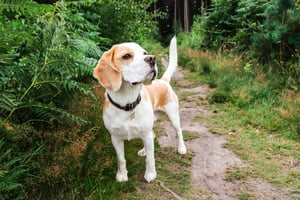Training a puppy is an essential part of raising a happy and healthy canine companion. Knowing how...
How to Discipline a Puppy from Biting You
Training and disciplining a puppy is an important part of being a responsible pet owner. Biting is a common problem among puppies, but it can be corrected with patience and consistency. In this article, we'll discuss the best methods to discipline a puppy from biting, and how you can use these techniques to help your pup learn appropriate behaviour.
Understand the Reasons for Puppy Biting
Before you can begin to discipline your puppy, it is important to understand why they are biting in the first place. Puppies bite for a variety of reasons, including teething, boredom, fear, and even aggression. It is important to identify the underlying cause of the biting behaviour before attempting to correct it.
If your puppy is teething, it is important to provide them with appropriate chew toys to help relieve their discomfort. If your puppy is bored, it is important to provide them with plenty of mental and physical stimulation. If your puppy is afraid, it is important to provide them with a safe and secure environment. If your puppy is exhibiting aggressive behaviour, it is important to seek professional help from a certified dog trainer.
Set Boundaries and Establish Rules
Once you have identified the underlying cause of the biting behaviour, it is important to set boundaries and establish rules for your puppy. This includes providing clear and consistent commands, such as “no” or “stop”, when they begin to bite. You should also use positive reinforcement when your puppy follows the rules, such as offering treats or praise. This will help your puppy learn which behaviours are acceptable and which are not.
Important: It is important to be consistent when setting boundaries and establishing rules. If you are inconsistent, your puppy will become confused and may not understand what is expected of them.
Redirect Your Puppy’s Attention
When your puppy begins to bite, it is important to redirect their attention. This can be done by providing them with an appropriate chew toy or engaging them in a game. This will help to distract them from their unwanted behaviour, and will also help to reinforce the idea that biting is not acceptable.
Choose Appropriate Punishments
If your puppy continues to bite despite your attempts to redirect their attention, it may be necessary to use punishments. However, it is important to choose punishments that are appropriate for your puppy’s age and size. For example, a small puppy may not respond well to physical punishment, so it is important to use verbal corrections or time-outs instead.
- Verbal corrections: Use a firm “no” or “stop” when your puppy begins to bite.
- Time-outs: Place your puppy in a quiet area for a few minutes if they continue to bite.
- Physical punishment: Use a spray bottle or a loud noise to startle your puppy if they continue to bite.
Important: It is important to remember that punishment should only be used as a last resort. If your puppy does not respond to other methods, then it may be necessary to use physical punishment. However, it is important to remember that physical punishment should never be used in a way that is cruel or causes harm to your puppy.
Provide Positive Reinforcement
It is also important to provide your puppy with positive reinforcement when they follow the rules. This can be done by offering treats or praise when they display appropriate behaviour. This will help to reinforce the idea that following the rules is rewarding, and will also help to build a strong bond between you and your puppy.
Training and disciplining a puppy can be a challenging task, but it is an important part of being a responsible pet owner. By understanding the reasons for puppy biting, setting boundaries and establishing rules, redirecting your puppy’s attention, and providing positive reinforcement, you can help your puppy learn appropriate behaviour and become a well-behaved pet.



